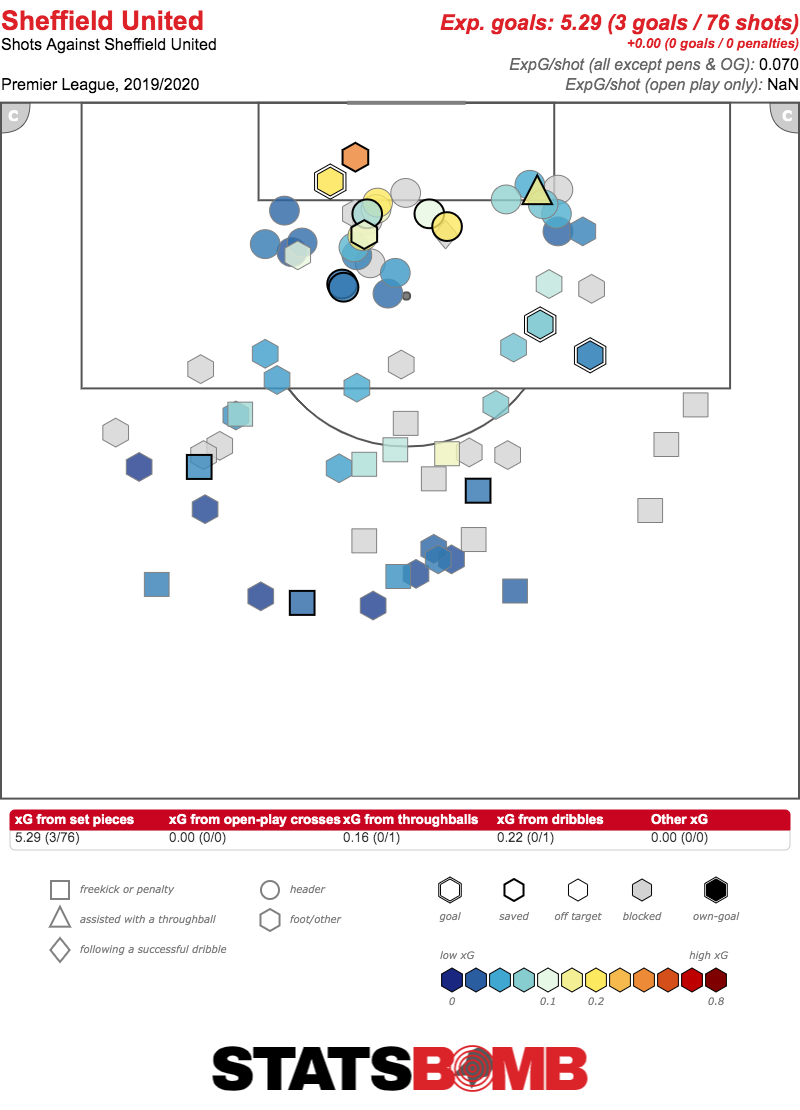“We haven’t covered Sheffield United in a while,” Goodman intoned from atop his editorial cathedra. “Find me an interesting Sheffield player to profile!” So, like one of the precogs in Minority Report, he lowered me into the viscous ooze of data. It was a trying experience. Everyone was . . . well, fine. There was a midfielder who led the team in progressive passing while only being mildly above average. There was a striker doing good work without any finishing luck to show for it. The centre backs were decent in the air. Nobody was bad in a way that could sustain 500 words of comedy or weird enough to justify a closer examination. The collective just worked. If you’re a fan of the Blades and not a mercenary, ink-stained wretch, this is good news. Sheffield United are fifth in the table and have the underlying numbers of a team above the relegation fray. Chris Wilder is doing a great job with a side that is largely the same as last year’s Championship runner-up. How wonderful. Defeated — a state this Gooner knows well — I returned to Goodman and grovelled. You can’t tell the story of Sheffield through the prism of a single player, I argued. You have to account for this entire, strange team. Here goes. The Blades achieved promotion by taking high-quality shots from close range and restricting their opponents to speculative shots. They were slow, but engineered overloads and mismatches in open play (overlapping centre-backs, anyone?) and on set pieces. Something would have to give when transposing much of the same ageing squad to the Premier League, the assumption went, but what? The Premier League version of Sheffield United have retained the focus on shot quality. In fact, only Manchester City’s shots are of a higher average quality. 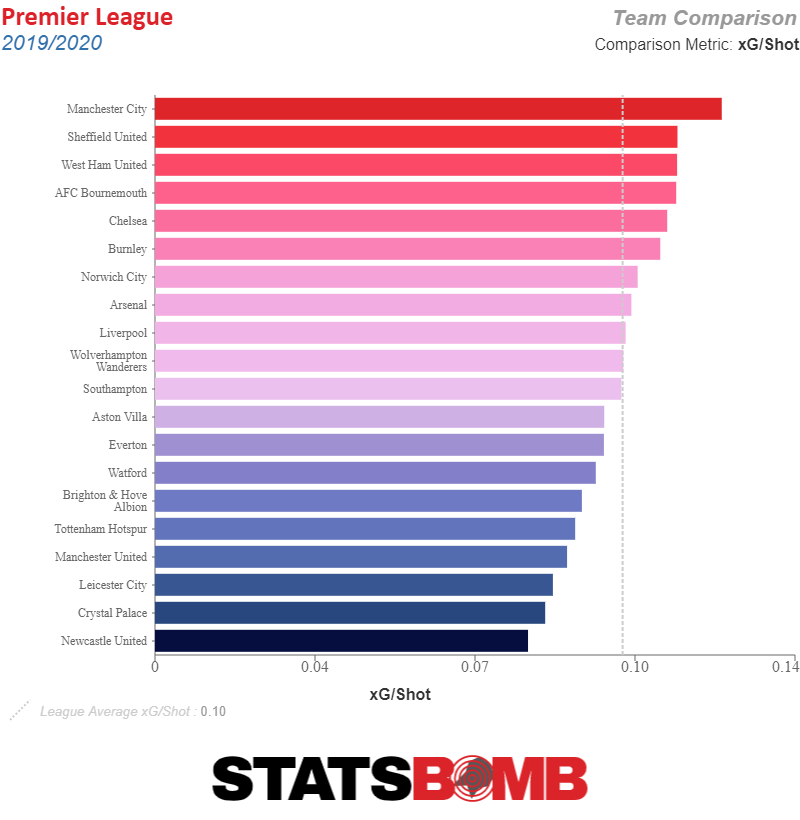 The Blades shoot from closer than league average and take the third-fewest shots from outside the box. While they try shots of a quality that rivals Man City, they’re taking them almost as rarely as Crystal Palace. They’ve gone from taking a middling number of shots in the Championship to the second-fewest in the Premier League.
The Blades shoot from closer than league average and take the third-fewest shots from outside the box. While they try shots of a quality that rivals Man City, they’re taking them almost as rarely as Crystal Palace. They’ve gone from taking a middling number of shots in the Championship to the second-fewest in the Premier League. 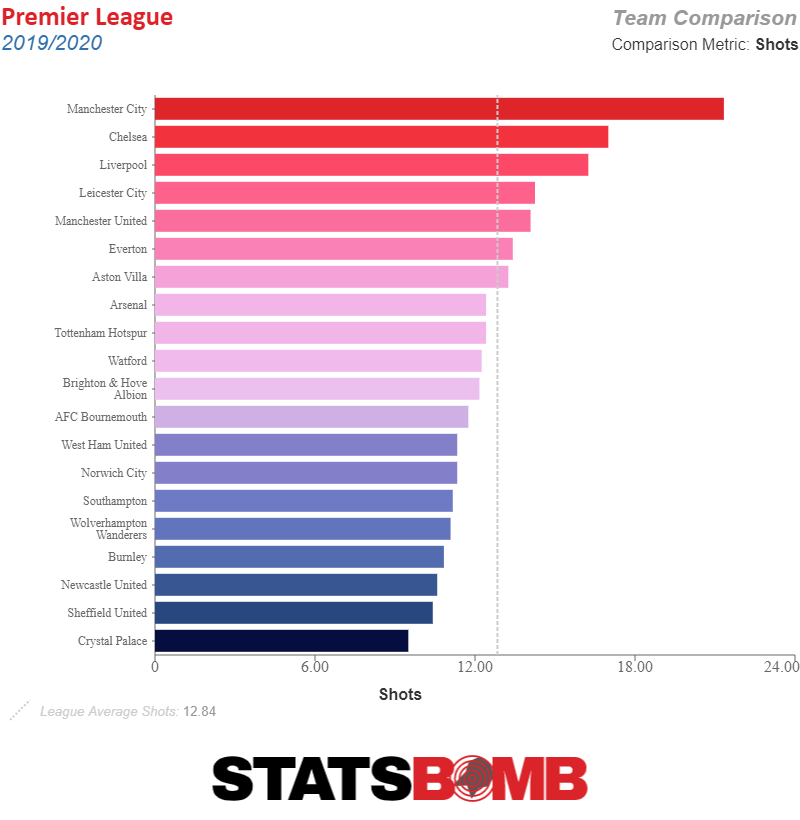 This Polian-esque approach to scoring — take shots; not many; mainly from close-range — has thus far worked out to a serviceable thirteenth-best expected goals total in the league. Sheffield United’s parsimonious approach to shot creation is viable so long as the team finishes those chances at a normal rate. The Blades have largely accomplished that, turning 14.6 expected goals into 13 goals. Striker David McGoldrick, who leads the team in xG per 90 minutes by a healthy margin, has yet to score. (Despite missing three matches, he nearly leads the team in xG.) His rough start to the season has been mitigated by new signing Lys Mousset doubling his 1.49 xG. These may not be elite players, but one can reasonably expect them to fall in line with their underlying numbers. If Sheffield United players ever finish normally, they’ll reveal this to be a classic Chris Wilder team. He is once again sharpening an edge to his side through set play design. The Blades are producing as many set play xG per match as in the Championship, which is good enough for fourth in the Premier League. Thus far, they’ve turned four expected goals off set pieces into two goals. This follows from the Blades’ other issues: You’d expect a team that sets out to cash in on set pieces yet has a misfiring striker to have a noticeable underperformance on set pieces. (Indeed, McGoldrick has generated 1.18 of his 2.87 xGs on set pieces.) Finishing luck notwithstanding, this is still a Chris Wilder attack. While Sheffield United has doubled down on offensive shot quality this season, effectively becoming a more extreme version of Wilder’s Championship side, it has become more typical in defence. Last year, the Blades forced opponents to take the worst and longest shots while conceding the third-fewest shots. This season, the shot they're most likely to concede is from closer range and of a higher quality than league average. They have, however, managed to concede the seventh-fewest shots in the league. Being fine in most defensive metrics averages out the Premier League’s tenth-best defence in terms of xG. The Blades’ are less quirky in defence, but they’re more effective. Yet not as effective as the league-second-best nine goals they’ve conceded suggests. The Blades have wildly overperformed their 15.32 xG conceded to be tied for the best defensive record in the league after 12 matches. Goalkeeper Dean Henderson has conceded 3.75 fewer goals than the average goalkeeper faced with the same set of shots.
This Polian-esque approach to scoring — take shots; not many; mainly from close-range — has thus far worked out to a serviceable thirteenth-best expected goals total in the league. Sheffield United’s parsimonious approach to shot creation is viable so long as the team finishes those chances at a normal rate. The Blades have largely accomplished that, turning 14.6 expected goals into 13 goals. Striker David McGoldrick, who leads the team in xG per 90 minutes by a healthy margin, has yet to score. (Despite missing three matches, he nearly leads the team in xG.) His rough start to the season has been mitigated by new signing Lys Mousset doubling his 1.49 xG. These may not be elite players, but one can reasonably expect them to fall in line with their underlying numbers. If Sheffield United players ever finish normally, they’ll reveal this to be a classic Chris Wilder team. He is once again sharpening an edge to his side through set play design. The Blades are producing as many set play xG per match as in the Championship, which is good enough for fourth in the Premier League. Thus far, they’ve turned four expected goals off set pieces into two goals. This follows from the Blades’ other issues: You’d expect a team that sets out to cash in on set pieces yet has a misfiring striker to have a noticeable underperformance on set pieces. (Indeed, McGoldrick has generated 1.18 of his 2.87 xGs on set pieces.) Finishing luck notwithstanding, this is still a Chris Wilder attack. While Sheffield United has doubled down on offensive shot quality this season, effectively becoming a more extreme version of Wilder’s Championship side, it has become more typical in defence. Last year, the Blades forced opponents to take the worst and longest shots while conceding the third-fewest shots. This season, the shot they're most likely to concede is from closer range and of a higher quality than league average. They have, however, managed to concede the seventh-fewest shots in the league. Being fine in most defensive metrics averages out the Premier League’s tenth-best defence in terms of xG. The Blades’ are less quirky in defence, but they’re more effective. Yet not as effective as the league-second-best nine goals they’ve conceded suggests. The Blades have wildly overperformed their 15.32 xG conceded to be tied for the best defensive record in the league after 12 matches. Goalkeeper Dean Henderson has conceded 3.75 fewer goals than the average goalkeeper faced with the same set of shots. 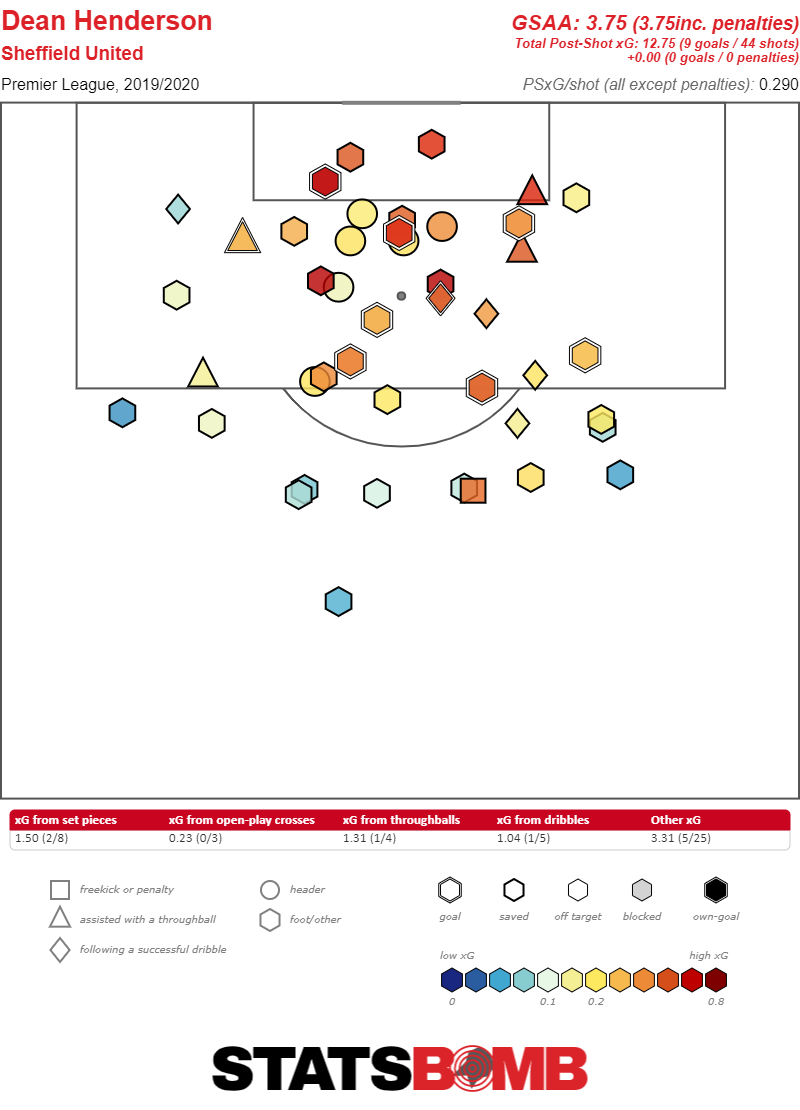 Even if the Manchester United loanee continues to add value, the Blades can’t expect opponents to finish so woefully going forward. Nobody should panic when Sheffield United’s defence comes back down to earth; everything’s going according to plan. At a very high level, Sheffield United has the hallmarks of a resolutely unfashionable Premier League side: an older, unheralded British squad; a manager who has paid his dues in the lower leagues; a solid defence; an attack that scores just enough goals. Is this team a Roy Hodgson fever dream? Is it Sean Dyche’s Burnley? (Wilder’s friendship with Dyche has encouraged the latter conclusion.) While well-intentioned, these comparisons mischaracterize Wilder’s managerial skills. His team may have a decent defence and adequate attack, but it’s doing a lot of interesting attacking work. To use a technical term: Chris Wilder is managing his ass off. Instead of accepting that his team will simply be less good in all aspects, or fully bunkering down, Wilder has recalibrated his shot efficiency machine from the Championship. Much of these changes are happening between the penalty boxes, where the Blades are defending deeper (10th in the league, between Chelsea and Arsenal) and pressing less than their figures in the Championship. Only Newcastle allows its opponents to complete more passes before performing a defensive action. Only Newcastle and Burnley have less of the ball. At the same time, Oliver Norwood, who helped pass Brighton and Fulham to promotion in successive seasons only to drop back down to the Championships both times, is providing serviceable progressive passing in midfield. Overlapping centre back Jack O’Connell is still moving all the way down the left flank to pass in open play. Wilder’s team has less of the ball this season, but they have a clear plan whenever they're in possession.
Even if the Manchester United loanee continues to add value, the Blades can’t expect opponents to finish so woefully going forward. Nobody should panic when Sheffield United’s defence comes back down to earth; everything’s going according to plan. At a very high level, Sheffield United has the hallmarks of a resolutely unfashionable Premier League side: an older, unheralded British squad; a manager who has paid his dues in the lower leagues; a solid defence; an attack that scores just enough goals. Is this team a Roy Hodgson fever dream? Is it Sean Dyche’s Burnley? (Wilder’s friendship with Dyche has encouraged the latter conclusion.) While well-intentioned, these comparisons mischaracterize Wilder’s managerial skills. His team may have a decent defence and adequate attack, but it’s doing a lot of interesting attacking work. To use a technical term: Chris Wilder is managing his ass off. Instead of accepting that his team will simply be less good in all aspects, or fully bunkering down, Wilder has recalibrated his shot efficiency machine from the Championship. Much of these changes are happening between the penalty boxes, where the Blades are defending deeper (10th in the league, between Chelsea and Arsenal) and pressing less than their figures in the Championship. Only Newcastle allows its opponents to complete more passes before performing a defensive action. Only Newcastle and Burnley have less of the ball. At the same time, Oliver Norwood, who helped pass Brighton and Fulham to promotion in successive seasons only to drop back down to the Championships both times, is providing serviceable progressive passing in midfield. Overlapping centre back Jack O’Connell is still moving all the way down the left flank to pass in open play. Wilder’s team has less of the ball this season, but they have a clear plan whenever they're in possession. 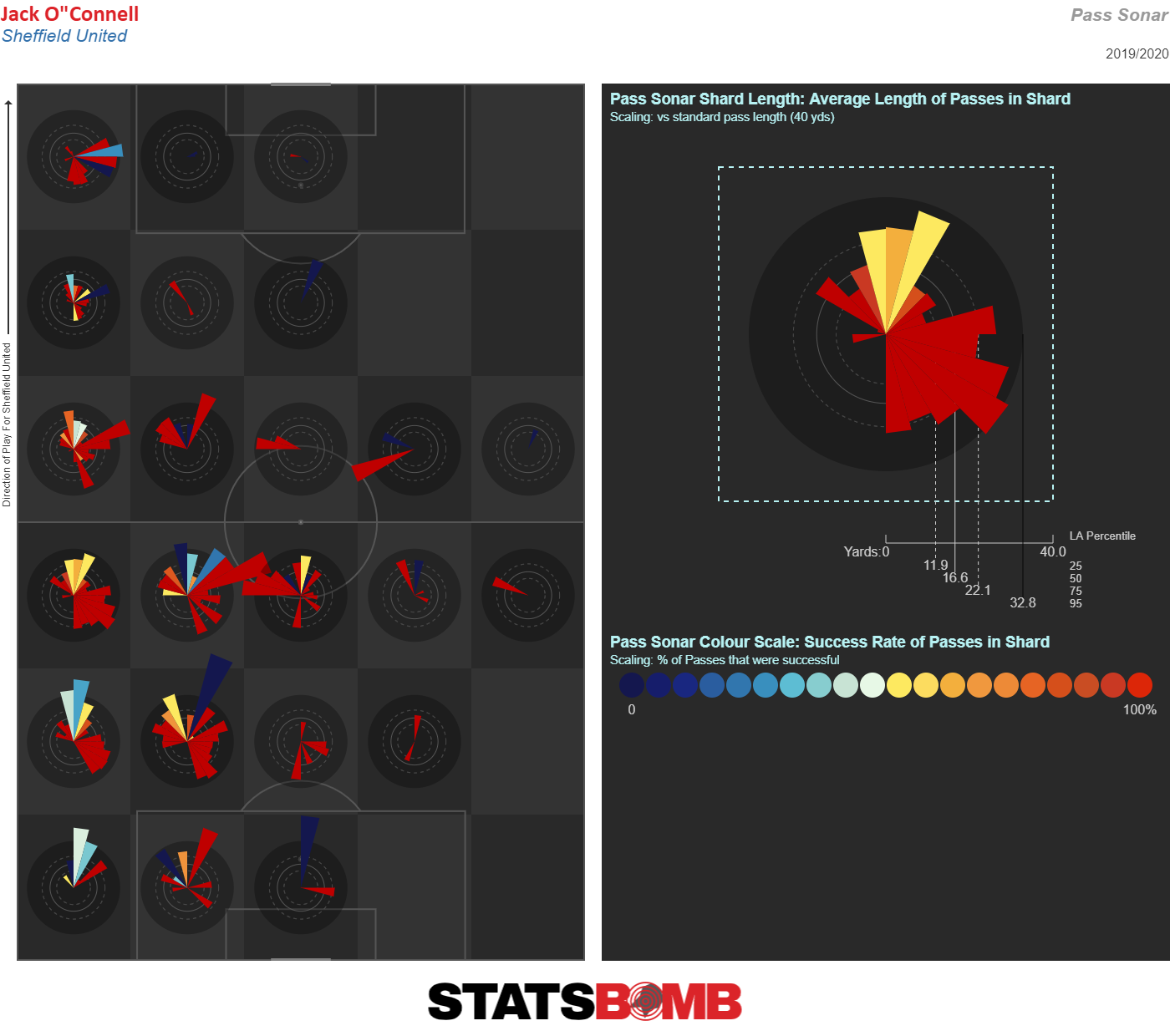 To the extent that the Blades are currently understood as an exciting team, it is because they are fifth in the table. That is not something promoted teams are wont to do. That is also not something a team with the ninth-best xG difference is likely to do going forward. Even when the Blades drop back to mid-table, though, they should remain an exciting team, one with an interesting vision of how to make the leap from the Championship to the Premier League. Chris Wilder’s players may not appear individually exciting, but what he’s doing with them sure is.
To the extent that the Blades are currently understood as an exciting team, it is because they are fifth in the table. That is not something promoted teams are wont to do. That is also not something a team with the ninth-best xG difference is likely to do going forward. Even when the Blades drop back to mid-table, though, they should remain an exciting team, one with an interesting vision of how to make the leap from the Championship to the Premier League. Chris Wilder’s players may not appear individually exciting, but what he’s doing with them sure is.
2019
Sheffield United are an unconventional success story
By admin
|
November 19, 2019
